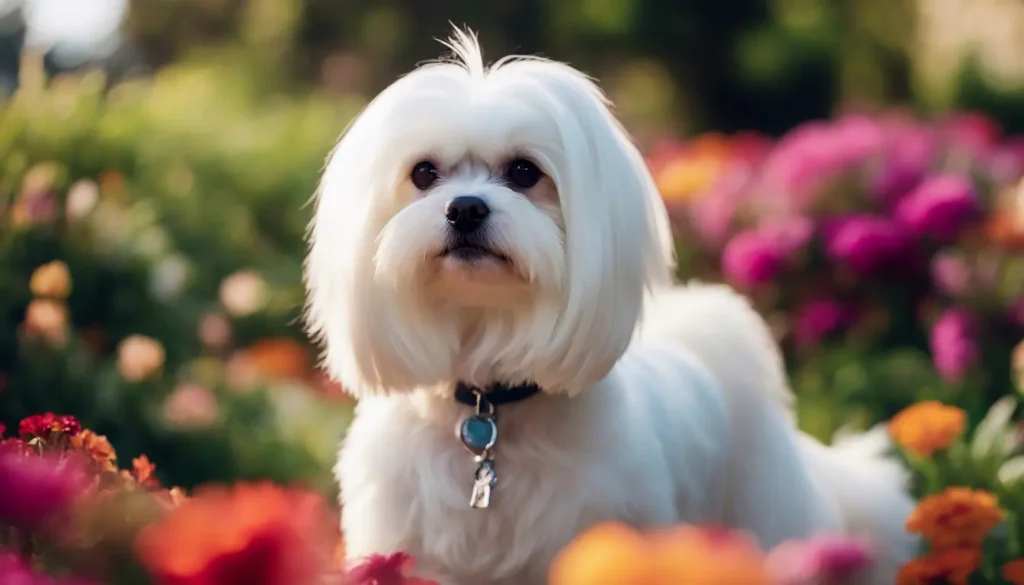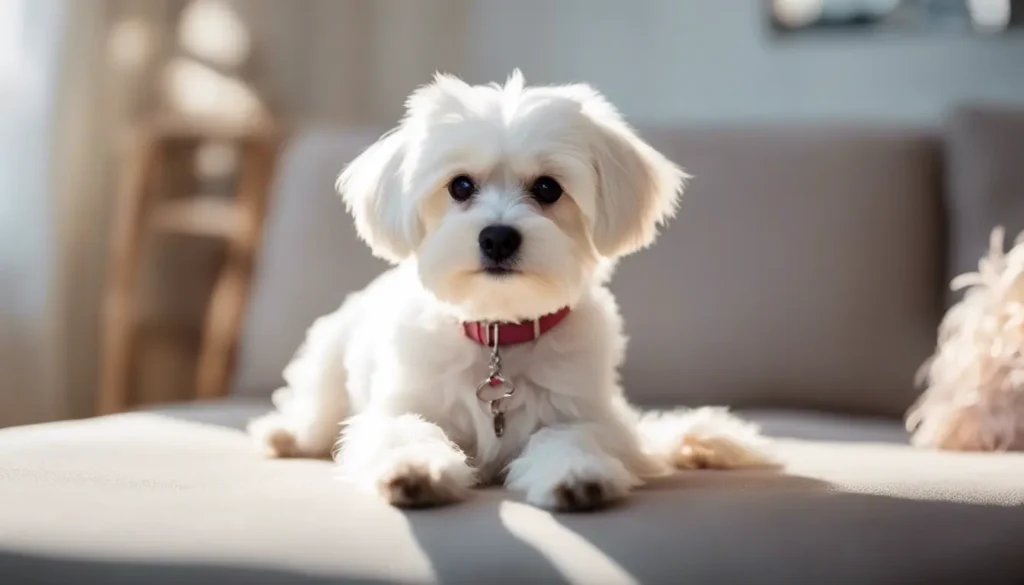With their glistening white coats and charming personalities, it’s no wonder Maltese dogs have been beloved companions for centuries. Originating from the Mediterranean island of Malta, the Maltese is an ancient breed that continues to capture hearts worldwide. If you’re considering adding one of these affectionate pups to your family, it’s helpful to understand their unique temperament. Here’s an in-depth look at what makes the Maltese dog breed unique.
Table of Contents
- 1 The Maltese Personality: Lively, Gentle and Affectionate
- 2 Playfulness and Activity Needs
- 3 Grooming Needs for a Maltese Coat
- 4 Ideal Environment for a Maltese Dog
- 5 Health and Lifespan of Maltese Dogs
- 6 Training a Maltese Dog
- 7 Matching a Maltese to Your Lifestyle
- 8 Finding Your Perfect Maltese Dog
- 9 Related posts:
- 10 Maltese Puppy Care: The Ultimate Guide
- 11 Maltese Dog Breed: Facts & Care
The Maltese Personality: Lively, Gentle and Affectionate
The Maltese personality is a delightful mix of playfulness, intelligence, and unwavering affection. They love nothing more than being close to their human owners. Maltese dogs are often described as “velcro dogs” because they tend to stick closely to their people. Unlike some toy breeds that can be yappy or snappy, Maltese are gentle. With family and friends, they are trusting, lively, and eager to play.
These pint-sized pups thrive on attention and companionship. Due to their empathetic nature and ability to sense human emotions, Maltese dogs make excellent therapy dogs. They shower their owners with kisses and happily curl up on your lap for hours of petting. The loving Maltese temperament is ideal for people seeking a devoted companion animal.

While gentle and sensitive, Maltese dogs also have a bold streak. They are fearless watchdogs who will loudly alert their owners to anything suspicious, whether a stranger approaching or an odd noise. Their confidence and courage allow them to stand their ground despite their small size. This natural wariness can be tempered to manageable levels with proper socialization and training.
Playfulness and Activity Needs
Maltese dogs have earned a reputation as lapdogs but need plentiful exercise and playtime. With their lively temperament, they love interactive games and learning tricks. A daily walk and opportunities to sprint and play off-leash in a securely fenced area are necessary. Toys that challenge their intelligence, such as puzzles or treat-dispensing balls, are also greatly enjoyed. Mentally stimulating activities will prevent boredom and destructive behaviors.

Due to their small bladder capacity, house training a Maltese calls for vigilance, patience, and positive reinforcement. Crate training is efficient for teaching puppies proper potty habits. While they are adaptable to apartment living, Maltese dogs should not be confined for long periods. They thrive when included in family activities and outings. Their portable size makes them an easy companion for walks, car rides, or cuddling on the couch.
Grooming Needs for a Maltese Coat
Perhaps the most distinguishing feature of the Maltese is their long, silky white coat. Maintaining this beautiful but high-maintenance coat is a labor of love for Maltese owners. Daily brushing and combing are essential to prevent painful mats and tangles. Many owners opt to keep their Maltese in a shorter “puppy cut” for simplicity.
Bathing approximately every 1-2 weeks with a gentle dog shampoo keeps the coat clean and helps prevent tear staining around the eyes. Nail trims, teeth brushing, and ear cleaning are also part of the regular grooming regimen. Grooming a Maltese can be a fun bonding activity for pet owners who enjoy pampering their pooch. Professional grooming every 4-6 weeks may be preferred for some owners.

Ideal Environment for a Maltese Dog
Given their small size, Maltese dogs do not tolerate extreme temperatures well. They thrive in temperate environments between 60-80°F. During very hot or cold weather, outdoor activities must be limited. You’ll also want to outfit your Maltese with a dog sweater or jacket for chilly walks.
Maltese adapt well to any home environment, including apartments of all sizes. The amount of time you can spend with your Maltese is more important than space. They could do better when frequently left alone for long hours. Lack of companionship and attention can lead to separation anxiety and behavioral issues. These intensely social pups need their people!
Getting along well with other pets depends mainly on early socialization and supervision. Some Maltese can interact wonderfully with cat housemates. When introducing a Maltese to another dog, time should be taken to monitor play and prevent bullying due to their small size. With training, they can successfully coexist with a variety of pets.

Health and Lifespan of Maltese Dogs
Given proper care, Maltese dogs typically live 12-15 years. Several genetic health issues are prevalent in the breed to be aware of. Following is an overview of the most common conditions and ways to support your Maltese’s wellbeing:
- Luxating patellas – Dislocated kneecaps are a relatively common orthopedic problem. It can often be managed conservatively with medication and exercise limitations.
- Dental disease – Maltese are prone to gingivitis, tooth loss, and infection. Daily tooth brushing and professional cleanings are preventative.
- Collapsing trachea – Weakened windpipes, often aggravated by obesity. Keep your Maltese lean and use a harness instead of a collar.
- Liver shunts – Abnormal blood vessels that allow blood to bypass the liver. It can be successfully treated with surgery in many cases.
- Bladder stones – Diet and genetics contribute to stone formation. Feed a food formulated for stone prevention.
- Retinal atrophy – Gradual vision loss. It can be detected in eye exams to determine the degree of impairment over time.
- Hypoglycemia – Low blood sugar common in toy breeds. Feed frequent small meals and avoid sugary treats.
Regular veterinary care, including prompt diagnosis and treatment of emerging conditions, is critical to your Maltese’s health. Be aware of signs indicating a trip to the vet is needed – appetite/weight changes, increased urination or thirst, altered behavior or activity levels. Your Maltese can remain a happy, lively companion with attentive care and preventative wellness.

Training a Maltese Dog
The Maltese temperament combines playfulness and intelligence, making them highly trainable dogs. Like all dogs, Maltese respond best to positive reinforcement training methods. Their innate eagerness to please makes reward-based training highly effective. Treats, praise, belly rubs – whatever your Maltese finds motivating – are the perfect incentives.
Early socialization and puppy classes lay the foundation for good manners and behavioral traits. Obedience training is critical to building communication, enhancing responsiveness, and preventing problem behaviors. Due to their sensitive natures, harsh reprimands or punishments are counterproductive and can damage the human-canine bond.
Maltese are quick studies in learning commands, tricks, and patterns. Consistency is critical – be sure all family members use the same cues and reinforcement during training sessions. Beyond structured training, weave training into your Maltese’s daily life by practicing lines and reinforcing desired behaviors during walks, playtime, and other activities.

Matching a Maltese to Your Lifestyle
The affectionate, people-centered Maltese temperament makes them an excellent choice for:
- Singles or seniors looking for a devoted lap dog and companion
- Retirees and others with flexible schedules that allow plenty of Maltese interaction and exercise
- Individuals with smaller living spaces want an adaptable indoor dog
- Experienced dog owners prepared to commit to thorough grooming requirements
- Households with older children who will interact gently and respectfully
- Those wanting an emotionally intuitive dog attuned to their moods
- Owners can bring their Maltese along on outings, vacations, and activities.
The Maltese may be less ideal for:
- Busy households where the dog is frequently left unattended
- Families who are away from home for extended work and school hours
- Those who travel extensively and need to board their dog routinely
- People want a backyard dog who lives primarily outdoors
- Novice owners unprepared for the intensive grooming needs
- Homes with very young or rambunctious children
By understanding your lifestyle and commitments, you can determine if the Maltese is the right breed for you. Their popularity worldwide speaks to their endearing temperament and versatility as companion dogs.

Finding Your Perfect Maltese Dog
Once you’ve decided that Maltese is the breed for you, try to find a healthy, well-bred puppy. Avoid pet stores and online sellers in favor of reputable breeders. Visit breeding facilities in person and meet parent dogs when possible. Responsible breeders perform health testing on their breeding stock and focus on temperament and longevity, not just appearance. Be prepared to join a waitlist, as quality Maltese litters are in high demand.
Bringing home your Maltese marks the start of a long and joyful companionship. Shower your puppy with love, attention, and early socialization experiences to nurture their exceptional temperament. Provide ongoing training, grooming, and veterinary care to give your Maltese the best opportunity for a vibrant, healthy life full of fun and affection.